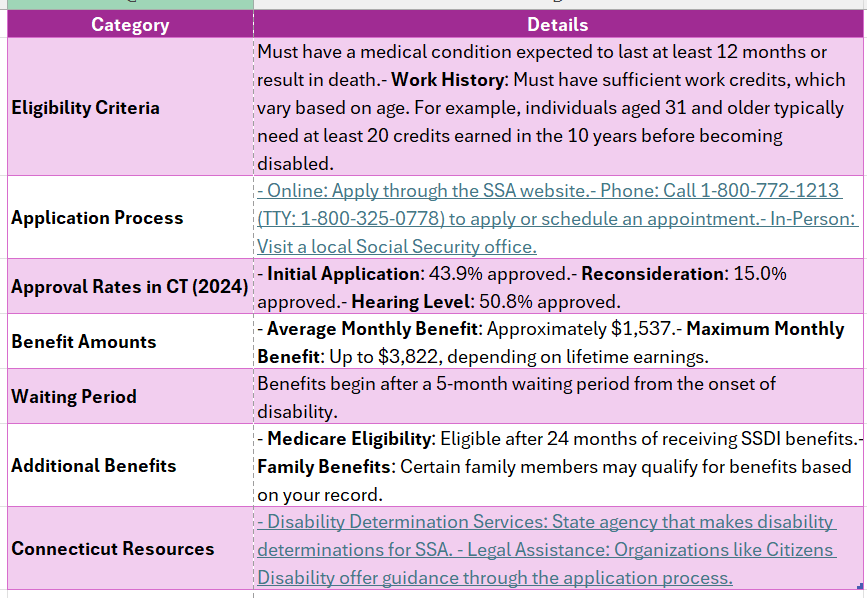How to Apply for SSDI CT in Connecticut ?
Looking for trusted legal experts to handle your case? Whether it’s a complex claim or a personal issue, FreeLegalCaseReview offers free consultations and expert advice tailored to your needs. Or call us directly at 833-248-4565.
Applying for Social Security Disability Insurance (SSDI) in Connecticut (CT) can seem overwhelming, but understanding the process is crucial. SSDI CT provides financial support to those unable to work due to severe disabilities. Knowing how to navigate the application can make a significant difference in your life.
Key Steps to Apply for SSDI in CT
- Gather Necessary Documents: Start by collecting your medical records, work history, and personal information. This will help speed up the application process.
- Check Your Eligibility: Make sure you meet the work requirements and have a qualifying condition.
- Submit Your Application: You can apply online, by phone, or in person at your local Social Security office.
What Conditions Automatically Qualify You For Disability
Some conditions are recognized by SSDI CT as automatically qualifying for benefits. These include:
- Cancer
- Multiple Sclerosis
- Severe Mental Disorders
- Heart Conditions
- Neurological Disorders
Understanding these conditions can help you determine if you might qualify without extensive documentation. Remember, the key is to provide clear evidence of your disability and how it affects your ability to work. By following these steps, you can simplify your SSDI application process in Connecticut.
Who Qualifies for SSDI Benefits in CT?

Applying for SSDI in Connecticut (CT) can be daunting, but knowing who qualifies can simplify the process. SSDI, or Social Security Disability Insurance, assists those unable to work due to severe medical conditions. Understanding your eligibility is crucial for securing the benefits you need.
To qualify for SSDI benefits in CT, you must meet certain criteria:
Work History and Credits
- You must have worked long enough to earn sufficient work credits, typically 20 credits in the last 10 years.
Medical Conditions
- Not all conditions qualify, but severe conditions like:
- Cancer
- Heart disease
- Multiple sclerosis
- Severe mental disorders automatically qualify you for disability, making the application process easier.
Age and Other Factors
- Your age affects eligibility; younger applicants may need more evidence of disability, while older applicants might qualify more easily.
Residual Functional Capacity (RFC)
- The SSA evaluates your ability to perform work-related activities. If your RFC indicates you cannot engage in substantial gainful activity, you may qualify for SSDI.
Application Process
- After confirming your eligibility, apply online, by phone, or in person at your local SSA office. Be ready with medical records and work history to support your claim.
Step-by-Step Guide to Applying for SSDI in Connecticut
Applying for SSDI in Connecticut (CT) can feel overwhelming, but understanding the process makes it easier. SSDI, or Social Security Disability Insurance, provides financial support for those unable to work due to a disability. Knowing how to navigate this system is crucial for your peace of mind and financial stability.
1. Check Your Eligibility
Before applying, ensure you meet the eligibility requirements. Generally, you must have worked in jobs covered by Social Security and have a medical condition that meets SSDI CT criteria.
2. Gather Necessary Documents
Collect important documents, such as:
- Your Social Security number
- Medical records
- Work history This information is vital for your application and can speed up the process.
3. Complete the Application
You can apply online, by phone, or in person at your local Social Security office. The online application is often the easiest. Be honest and thorough when filling out the forms.
4. Wait for a Decision
After submitting your application, it may take several months to receive a decision. During this time, you can check the status of your application online. If denied, don’t lose hope; many people appeal their decisions successfully.
What Conditions Automatically Qualify You For Disability?
Certain conditions, like severe mental disorders or specific physical ailments, can automatically qualify you for SSDI. Understanding these can help you prepare your case better. Remember, each situation is unique, so consult with a professional if needed.
Common Mistakes to Avoid When Applying for SSDI CT
Applying for SSDI in Connecticut (CT) can be daunting, especially if you’re unsure about the process. Understanding common mistakes can save you time and frustration. By avoiding these pitfalls, you increase your chances of approval and can focus on what matters most—your health and well-being.
- Not Providing Enough Medical Evidence: Failing to include sufficient medical documentation is a major mistake. Gather all relevant medical records to support your claim.
- Ignoring the Listing of Impairments: Familiarize yourself with the Social Security Administration’s list of conditions. Knowing what conditions automatically qualify you for disability can clarify your eligibility.
- Missing Deadlines: SSDI applications have strict deadlines. Be mindful of submission dates and required follow-ups, as missing them can delay your benefits significantly.
- Not Seeking Help: Many applicants try to navigate the process alone. Consulting with a disability attorney or advocate can guide you and help avoid common errors.
- Overlooking the Importance of Consistency: Ensure your statements and medical records align. Discrepancies can raise red flags and lead to denial.
- Failing to Follow Up: After submitting your application, check on its status regularly to catch any issues early.
- Not Understanding the Appeals Process: If denied, don’t lose hope. Familiarize yourself with the appeals process to improve your chances on a second attempt.
By avoiding these mistakes, you can make your SSDI application process smoother and more efficient. Preparation is key!
Ready to connect with top legal professionals? Get immediate support— Call us at 833-248-4565.
How Long Does the SSDI Application Process Take in Connecticut?
Applying for SSDI in Connecticut (CT) can feel overwhelming, especially when you’re unsure about the timeline. Understanding how long the SSDI application process takes is crucial for planning your next steps. After all, waiting for benefits can add stress to an already challenging situation.
The SSDI application process in Connecticut typically takes about three to five months. However, this timeline can vary based on several factors, including the complexity of your case and the volume of applications being processed.
Factors That Affect Processing Time
- Completeness of Application: Ensure all required documents are submitted to avoid delays.
- Medical Evidence: The more comprehensive your medical records, the smoother the process.
- Backlogs: Sometimes, the Social Security Administration (SSA) experiences backlogs that can extend wait times.
If you’re wondering, What conditions automatically qualify you for disability?, it’s important to know that certain conditions, like severe mental disorders or terminal illnesses, can expedite your application. However, even if your condition isn’t on the list, you may still qualify based on your work history and the severity of your disability.
In summary, while the SSDI application process in CT can take several months, being prepared and understanding the requirements can help you navigate it more smoothly. Remember, patience is key, and seeking assistance can make a big difference!
Read Also: What Conditions Automatically Qualify You for Disability?
What to Expect After You Submit Your SSDI Application in CT
After submitting your SSDI application in Connecticut (CT), it’s normal to feel both excited and anxious. Knowing what to expect next can help ease your worries and prepare you for the process ahead.
What Happens Next?
Your application will be reviewed by the Social Security Administration (SSA), which checks if you meet the basic eligibility requirements for SSDI CT. They will assess your work history and whether your medical condition qualifies you for benefits.
The Review Process
During the review, the SSA evaluates your medical records and may contact your doctors for additional information. Here are some key points to keep in mind:
- Processing Time: Expect several months for a decision.
- Possible Outcomes: You could be approved, denied, or asked for more information.
- What Conditions Automatically Qualify You For Disability: Certain conditions, like cancer or severe mental disorders, may expedite your application.
Stay patient and monitor any communication from the SSA.
If Denied
If denied, don’t lose hope! You can appeal the decision, which involves several steps, including reconsideration and possibly a hearing before an administrative law judge.
Staying Informed
While waiting, stay informed by checking your application status online or calling the SSA. Keeping communication open helps you understand your standing in the process.
Seeking Help
Consider reaching out to a disability advocate or attorney for guidance through the complexities of SSDI CT, which can improve your chances of approval.
How FreeLegalCaseReview Can Help You Navigate the SSDI Application Process
Applying for SSDI in Connecticut (CT) can feel overwhelming, but it doesn’t have to be. Understanding the process is crucial because it can provide you with the financial support you need during tough times. At FreeLegalCaseReview, we’re here to guide you every step of the way, making the journey smoother and less stressful.
Navigating the SSDI application process can be tricky. Here’s how we can assist you:
- Personalized Guidance: We help you understand what conditions automatically qualify you for disability, ensuring you meet the necessary criteria.
- Application Assistance: Our team can walk you through the paperwork, making sure everything is filled out correctly to avoid delays.
- Appeal Support: If your application is denied, we can help you understand your options and assist with the appeal process.
With our expertise, you won’t feel lost in the sea of paperwork and regulations. We aim to empower you with knowledge and support, so you can focus on what matters most—your health and well-being. Remember, you’re not alone in this journey; FreeLegalCaseReview is here to help you secure the SSDI benefits you deserve in CT.
Don’t wait to secure the legal representation you deserve. Visit FreeLegalCaseReview today for free quotes and tailored guidance, or call 833-248-4565 for immediate assistance.
You can also visit LegalCaseReview to find the best Lawyer.
FAQs
1. What is SSDI, and who is eligible to apply in Connecticut?
SSDI is a federal program that provides benefits to individuals who are disabled and unable to work. To be eligible in Connecticut, you must have worked in jobs covered by Social Security and paid Social Security taxes. Additionally, you must have a disability that meets Social Security’s definition and be unable to perform substantial gainful activity.
2. How do I apply for SSDI in Connecticut?
You can apply for SSDI online at the Social Security Administration (SSA) website, by phone, or in person at your local SSA office in Connecticut. You will need to provide detailed information about your medical condition, work history, and other relevant documents.
3. How long does it take to get approved for SSDI in Connecticut?
The approval process for SSDI can take several months, typically ranging from 3 to 5 months, but it can take longer depending on the complexity of your case and whether additional medical information is needed.
4. Can I apply for SSDI benefits if I am receiving workers’ compensation in Connecticut?
Yes, you can apply for SSDI even if you are receiving workers’ compensation. However, receiving both may affect the amount of SSDI you are eligible to receive. The SSA has a formula to adjust the total benefits if you are receiving both types of assistance.
5. How much money can I receive from SSDI in Connecticut?
The amount of SSDI benefits you can receive depends on your lifetime average earnings, up to a maximum set by the SSA. The average SSDI payment in 2025 is about $1,400 per month, but this amount varies for each individual based on their work history.
6. Can I work while receiving SSDI benefits in Connecticut?
You may be able to work while receiving SSDI benefits, but there are strict limits on how much you can earn. The SSA has a program called the “Trial Work Period,” which allows you to test your ability to work for up to nine months without losing benefits.




